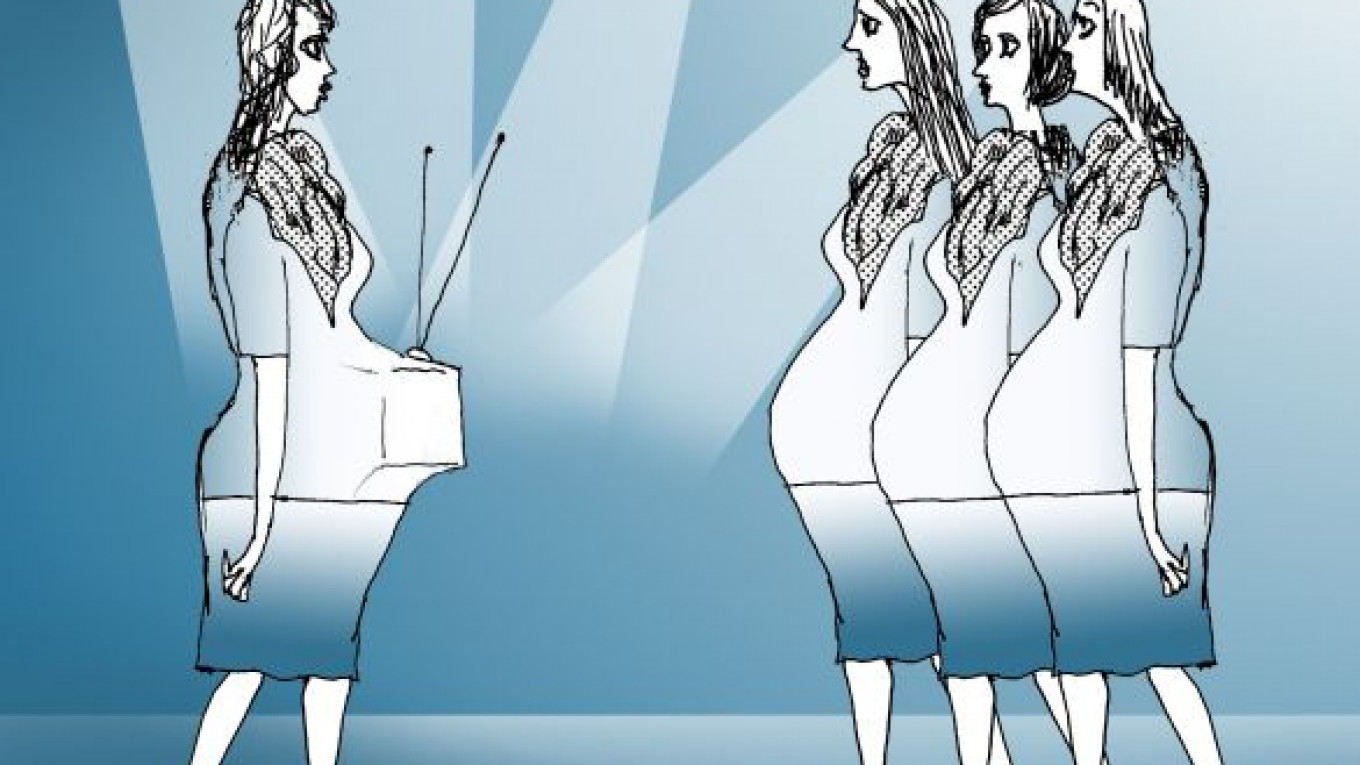In MTV Russia’s new reality show, “I’m Having a Baby,” four teenage girls are expecting their first babies, with varying degrees of support from parents, boyfriends and husbands.
The girls, aged 17 and 18, vary from a few months pregnant to being on the verge of giving birth.
There’s sensible Nastya, 18, who works as a children’s entertainer at a tropical-themed resort in the Moscow region. She says she has been ready to be a mother since she was 14 and did not panic at all when she found out the news. Her boyfriend, Danila, is another matter. He lies in bed, skipping work, an ashtray propped on his stomach.
“I feel like Danila himself is a child,” Nastya complains.
The couple has managed to rear a rat in a cage, but Nastya points out to Danila that a baby will be more complex, since it won’t be able to survive on a monthly bag of food that costs 45 rubles.
In the case of Ksenia, 18, it’s pretty clear that her long-suffering mother will have to take on most of the care. Ksenia, whose face is peppered with piercings, shouts at her boyfriend Kirill for dropping his used teabags on the floor, while he argues that picking them up is “not man’s work.”
Kirill explains that the couple, living with Ksenia’s parents, “did not use condoms on principle.”
When the couple decides to say it with a shared tattoo, Kirill gets the word “true” and Ksenia gets “love,” although they manage to bicker even under the needle.
At one point, the camera shows Ksenia smoking a roll-up, a shocking moment that goes without any comment.
Even more shocking is the story of Vika from Abkhazia. She is 17, while her journalist husband, Anton, is 30. He was crowned the “best journalist in Abkhazia,” the voice-over says.
Vika has a beautiful childlike face, but her bump is enormous. She goes in for her first ever ultrasound test — her husband explains that the move and her lack of Russian citizenship means that she hasn’t had a single test, even though they have been in Moscow for eight months.
Even more disturbingly, she mentions that Anton “stole” her as a bride when she was younger than 15. Getting married was illegal, but anything is possible in Abkhazia, she adds, smiling shyly.
They are living with Anton’s parents, who hardly bother to hide their disapproval and desire for them to live separately. His mother calls Vika a “child” who does not understand love, as she lies in bed, miserably, suffering from pains.
The most settled of the girls, Antonina is a calm blonde, living in her own comfortable apartment with her chef husband. Having a baby was a logical step in her family, the voice-over says, since her mom was the same age. A very youthful grandmother-to-be while still in her 30s, her mom says that all her friends are laughing at the idea.
The show has a somewhat different flavor from MTV’s “Teen Mom,” which is very much aimed at showing unwanted pregnancies and teaching life lessons about using contraception. That’s probably because in Russia, having a baby young does not necessarily mark you out as a member of an underclass. One word I did not hear on the show was “accident.” It sounded as if all the babies were planned in some sense.
Describing all the girls’ relationships as stable might be pushing it, but they had someone at their side and it was pretty obvious that parents were ready to leap in with childcare, housing and food — even if some of the girls did not seem particularly appreciative.
The unanswered question really was why they were in such a rush.
A Message from The Moscow Times:
Dear readers,
We are facing unprecedented challenges. Russia's Prosecutor General's Office has designated The Moscow Times as an "undesirable" organization, criminalizing our work and putting our staff at risk of prosecution. This follows our earlier unjust labeling as a "foreign agent."
These actions are direct attempts to silence independent journalism in Russia. The authorities claim our work "discredits the decisions of the Russian leadership." We see things differently: we strive to provide accurate, unbiased reporting on Russia.
We, the journalists of The Moscow Times, refuse to be silenced. But to continue our work, we need your help.
Your support, no matter how small, makes a world of difference. If you can, please support us monthly starting from just $2. It's quick to set up, and every contribution makes a significant impact.
By supporting The Moscow Times, you're defending open, independent journalism in the face of repression. Thank you for standing with us.
Remind me later.






